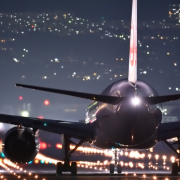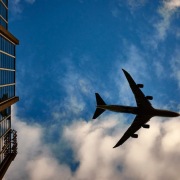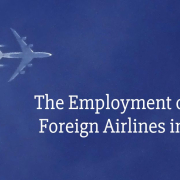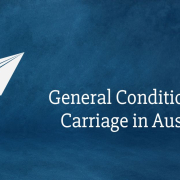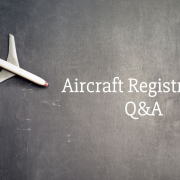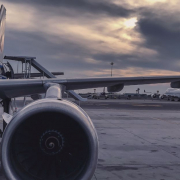For most airlines it is natural to operate internationally. In Europe, international air traffic is particularly dense due to the manifold economic interdependencies between its countries, the personal, cross-border connections within its populace as well as the extensive liberalisation of air traffic, including the granting of freedoms of the air in recent decades.
To ensure that operations run as smoothly as possible, staff are needed not only at the airline’s headquarters, but also at the individual destinations flown by the airline. Airlines often outsource numerous tasks to external companies, while employing own station managers to organise and coordinate the work done by third-party providers and the airline’s employees. However, the airline’s commitment to the particular market or base can also be more intensive and range from employing the foreign airline’s own staff in Austria, to establishing a branch office or even setting up an Austrian subsidiary entity of its own.
In the following we would like to give an overview of what needs to be considered by foreign airlines when employing staff other than crew members (e.g., ground staff) in Austria. There are certain special rules applicable to the employment of crew members in Austria, which will not be covered in this article. Although the following overview has the “standard case” of a foreign airline as its point of departure, it will prove relevant also for other foreign aviation businesses – especially so in the area of business aviation.
Work and residence permit
When employing staff from non-EU countries in Austria, a residence and work permit issued in accordance with the Settlement and Residence Act (“NAG”) and the Employment of Foreign Nationals Act (“AuslBG”) is generally required. Residence and work permits are usually issued by the administrative authorities having jurisdiction over the future Austrian residence of the foreign employee following a positive assessment of the employee’s qualifications and their employment conditions by the Austrian Public Employment Service (“AMS”).
The most common form of a residence and work permit is the so-called “Red-White-Red Card”. The decision as to whether a worker may be employed in Austria depends initially on the authority’s assessment of the employee on the basis of a predefined, qualification-based points system. The Red-White-Red Card is available in several variants, with the “Red-White-Red Card for Other Key Personnel” offering most flexibility with regard to its requirements and possible employment options and is generally suitable for employees with a university degree as well as for employees without proof of higher education who acquired their knowledge and skills “on the job” in the course of their professional experience. The Red-White-Red Card is conditional upon the employee having adequate professional experience, qualifications, and sufficient language skills in German or English as well as receiving a sufficient salary (2023: EUR 2,925 gross per month) from the (future) employer in Austria.
In the case of temporary intra-corporate transfers of employees (i.e. intra-corporate transferees, ICTs), special, more favourable provisions (based on the EU Directive 2014/66/EU) apply. ICTs are employees with the nationality of a non-EU state who are temporarily transferred by their employer with its registered office in a non-EU state in the course of their employment relationship as managers, specialists or as trainees to one or more branches of their employer in the EU (or those of an EU company being part of the same group of undertakings as the employer). An ICT residence title for “managers” will be suitable for employees holding a senior position, who primarily direct the management of the host entity or of one of its departments or subdivisions. The ICT card for “specialists” is particularly suitable for persons who have specialised knowledge relevant to the fields of activity, procedures or administration of the receiving entity and a high level of qualification for certain tasks or activities requiring specific technical knowledge. The ICT card for “trainee employees”, on the other hand, requires that the employee have a university degree and be transferred to the Austrian branch for the purpose of their career development or further (sector-specific, technical or methodological) training. Thus, when choosing the residence title, the employer has to consider not only the employee’s personal, educational, and professional background, but also the needs of the Austrian host entity. These must be presented and argued accordingly in the application for the ICT title, which often causes difficulties in practice.
Citizens from EU member states, EEA states and Switzerland have free access to the Austrian labour market and therefore do not need any authorisation from the labour market authorities to take up employment in Austria. In this respect, they are on an equal footing with Austrian citizens.
When employing a foreign employee (whether on the basis of a work permit or not), the employer must comply with Austrian wage and working conditions as well as the applicable social security regulations. Failure to do so may result in the authorities prohibiting the employment and revoking the residence permit and work permit issued to the foreign employee (if one was required).
Applicable law
According to the EU Rome I Regulation (593/2008/EC), which is applicable in Austria, individual employment contracts are governed by the law of the state in which or from which the employee habitually carries out their work in performance of the employment contract. The temporary performance of work in another state does not change this. For crew members, the usual place of work will usually be their home base.
However, the parties are also free to agree on the applicability of another law to the employment relationship. Here, however, a qualification must be observed whereby this choice of law must not result in the employee being deprived of the protection that would have been granted to them by the mandatory law applicable in the absence of a choice of law.
This means, in short, that although it is possible to stipulate in the employment contract of an employee who habitually performs their work in or from Austria that their employment relationship should be governed by foreign law (for example, the law of the country in which the airline is based), the mandatory Austrian provisions of labour law must nonetheless be observed.
The provisions of (mandatory) collective labour law, such as those regulating the possibility of electing a works council, concluding works agreements and challenging dismissals, will apply as soon as the foreign airline establishes an operational unit (“Betrieb”) in Austria. A choice of law is not possible here.
Which issues require particular attention in terms of labour law?
Austrian labour law is relatively complex and characterised by the existence of various legal sources organised in a hierarchy of norms. Employers have to observe not only statutes and the individual employment contracts, but also the so-called collective agreements (contracts concluded between the collective representatives of employers’ and those of the employees) and as well as so-called works agreements (if a works council exists).
Of particular relevance in everyday working life are the provisions on working time (especially maximum working hours and overtime pay), the regulations on periods in which employees are unfit for work, paid and unpaid leave, as well as the regulations on minimum wages. Although there is virtually no statutory minimum wage in Austria, there exists a plethora of collective agreements covering a fairly wide spectrum of businesses, including foreign airlines, which in turn stipulate minimum wages. These minimum wages must also be observed by employers not based in Austria (and falling outside of the scope of the collective agreements) due to the mandatory provisions of the Wage and Social Dumping Prevention Act (“LSD-BG“).
Furthermore, the (foreign) employee must also comply with the provisions of Austrian social and (income) tax law, which are both fairly complex and mandatory.
The Collective Agreement for Foreign Airlines in Austria
For foreign airlines, the Collective agreement for white-collar employees and other staff of foreign airlines in Austria is of particular day-to-day relevance.
Although this collective agreement was primarily negotiated for sales and station staff, it now applies to all employees of foreign airlines working in Austria (including crew members). The only exceptions are those employees who have been transferred to Austria and whose contracts of employment are subject to foreign employment law, as well as executive employees.
This collective agreement contains various regulations that must be observed by foreign airlines. These include, in particular, provisions on overtime pay, normal working hours and, importantly, minimum wages. Accordingly, employers have to classify their employees according to a scheme laid down in the collective agreement and pay them at least the minimum wage set out in the remuneration scheme set therein – a task which is not always easy (not least due to the genesis of the collective agreement and its wide scope of application). Underpayment can not only lead to civil law claims by employees under their employment contracts, but also to draconian administrative fines of up to EUR 400,000 under the Austrian Wage and Social Dumping Prevention Act.
Furthermore, the collective agreement also stipulates that employees are entitled to a holiday allowance in the amount of one month’s basic salary as well as a Christmas bonus in the amount of the November salary in addition to their regular monthly salary. Such special payments are customarily stipulated in Austrian collective agreements, which is why in Austria it is generally said that employees receive 14 salaries per year.
Posting Employees to Austria
In some cases, foreign airlines prefer to send to Austria staff already employed by them at their headquarters in managerial positions or as specialists in a particular field. In this case, the Collective Agreement for Employees and Other Workers of Foreign Airlines will not apply if the employment contract is still subject to foreign employment law. This does not mean, however, that Austrian labour law is entirely inapplicable or that there are no mandatory regulations with regard to minimum wage. Indeed, the provisions of the Austrian Wage and Social Dumping Combating Act (“LSD-BG“) must still be observed.
Accordingly, there are strict reporting and documentation obligations for all postings to Austria. The reporting and residence law obligations vary depending on whether the posting employers and the posted employees are citizens of the EU, EEA, Switzerland or of other third countries.
Posting companies based in the EU, the EEA or Switzerland must report postings of third-country nationals to the Central Co-Ordinating Agency (ZKO) of the Anti-Fraud Office before the planned commencement of work by the posted employee. Subsequently, the Central Co-Ordinating Agency forwards such notifications to the Austrian Public Employment Service (AMS), which must issue, within two weeks of receipt of the notification, an “EU posting confirmation” if the prerequisites for the posting are met or, if the prerequisites are not met, prohibit the posting. In addition to the EU posting confirmation, the third-country national employee must also have a valid visa or (in the case of postings for more than 6 months) a suitable residence permit, which must be applied for separately with the competent authority.
If the posting company (employer) is based in a third country, the posting of third-country nationals requires a posting permit or an employment permit (depending on the duration of the posting), which must be applied for directly with the AMS. A posting permit can be issued to posted third-country nationals for a maximum duration of 4 months provided that the work for which they are deployed does not last longer than six months. If the work lasts longer than six months or the employment of the posted employee lasts longer than four months, an employment permit must be applied for instead of a posting permit. In these cases, too, the third-country national must have a valid visa or a suitable residence title in Austria, which, again, must be applied for separately.
Furthermore, the foreign employer must also comply with the provisions of Austrian social law, according to which, depending on the circumstances of the posting, either proof of existing insurance in the employee’s country of habitual employment or registration with the Austrian social insurance system is required. This issue often leads to problems in practice and the solution to it will depend above all on whether there are social law agreements concluded between Austria and the country of habitual employment of the posted employee. In the case of a posting within the EU, a confirmation (“A1 certificate”) must be applied for from the competent social security institution of the posting country. The A1 certificate is a document which states in a binding manner that only the social security laws of the posting country (and not Austrian social security law) are applicable to the posted employee (for the duration of the posting). The A1 certificate is therefore an important instrument for the foreign employer-company which it can employ to mitigate its social security liabilities in a relatively uncomplicated manner.
However, it must be pointed out that during their posting to Austria, the posted will enjoy certain rights under Austrian labour law. For example, they are entitled to at least the same remuneration as is stipulated (by statute or collective agreements) for comparable work done for comparable employers in Austria (including the holiday allowance and the Christmas bonus). Thus, the minimum wages laid down in the collective agreements are also applicable to posted workers by operation of the Austrian Wage and Social Dumping Combating Act (LSD-BG). The working time limits and minimum rest periods applicable in Austria must also be observed and the paid leave provided for under Austrian law must be granted.
In case of more detailed questions that can easily arise in connection with the complex issues related to the employment of staff of foreign airlines in Austria, our Aviation Team is happy to assist and offer further advice.
Click here for the pdf version of our article on the employment of staff of foreign airlines in Austria.


